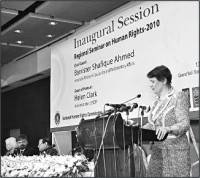Law event
The Dhaka Declaration on Human Rights and National Human Rights Institutions
 The Regional Seminar on Human Rights National Human Rights Commission: Experiences and Challenges took place in Dhaka, Bangladesh, on 13-14 November 2010, hosted and organised by the National Human Rights Commission of Bangladesh (NHRC), with the support of the United Nations Development Programme (UNDP).
The Regional Seminar on Human Rights National Human Rights Commission: Experiences and Challenges took place in Dhaka, Bangladesh, on 13-14 November 2010, hosted and organised by the National Human Rights Commission of Bangladesh (NHRC), with the support of the United Nations Development Programme (UNDP).
Participants thanked the NHRC and UNDP and the governments of Bangladesh, Denmark, Korea, Sweden and Switzerland for their commitment and support of the organisation of the Seminar. The presence of NHRIs from India, Indonesia, Malaysia, Maldives, Nepal, and New Zealand, as well as foreign and local dignitaries, was also acknowledged.
These statements were followed by an interactive session, chaired by Mr Peter Hosking, former Human Rights Commissioner from New Zealand, which involved all NHRIs attending the Seminar, with questions from the audience.
There were also interactive and productive discussions in six working groups on human rights issues of significance to NHRIs. These discussions reflected the experience and diversity of NHRIs present and representatives of international organisations, government and civil society organisations.
The Regional Human Rights Seminar adopted the following Declaration:
* Reaffirming the inherent dignity, equal and inalienable rights of all human beings, the need for universal and effective recognition of human rights and fundamental freedoms, and to promote social progress and better standards of living, as expressed in the Universal Declaration of Human Rights;
* Recognising the significant role played by non-state actors such as individuals, non-governmental organisations, the media and corporations play in defending human rights as a voice for the voiceless and as watchdogs;
* Emphasising the importance of independent, transparent, accountable and effective national human rights institutions with broad mandates to promote and protect all human rights, in accordance with the Principles relating to the status of national institutions under UN General Assembly Resolution 48/134 20 December 1993 (Paris Principles);
* Further emphasising the importance, in accordance with the Paris Principles, of every NHRI having adequate funding to enable it to have its own staff and premises, in order to be independent and not be subject to financial control or interference by government which might impair that independence;
Welcoming the valuable discussions of the Seminar's six Working Groups which addressed the following issues:
* The role of non-state actors in promoting and defending human rights and experiences in the region;
* The responsibilities of the state to promote and defend human rights and experiences in the region;
* Human rights and women in the Asia Pacific region;
* Human rights and indigenous peoples, minorities and migrant workers in the Asia Pacific region;
* Rights of the child: child labour and human trafficking;
* The challenges ahead for human rights in the Asia Pacific region
The participants here assembled agree:
* NHRIs should initiate formal dialogue with relevant non-state actors when taking up human rights issues, to develop a common understanding on human rights that reflects their universality, indivisibility, interdependence and interrelatedness. Public awareness raising should educate the people and empower the poor. NHRIs should work to have human rights included in all education curricula and training programmes for relevant professional groups such as the police and the judiciary;
* NHRIs should encourage their states to sign, ratify and effectively implement international human rights obligations, including the Convention on the Rights of People with Disabilities, by developing human rights action plans and policies that enable the full participation of all marginalised groups with adequate provision for monitoring and evaluation. Recognising the intersection of human rights and development, NHRIs should assist the government and international donors in the pursuit of development goals (including the MDGs) to secure economic, social and cultural rights and access to justice for all.
* To ensure its complete independence, separate rules of business should be developed for the Bangladesh NHRC. These should enable the NHRC to act without the need for approval or permission from any executive authority;
* Women's rights are human rights. NHRIs should pay particular attention to being accessible to, known and trusted by women. NHRI programmes should be:
- outcome-oriented focused on implementation as much as improving the legal environment;
- developed in partnership with women and audited from a gender perspective;
- acknowledge the causes of violence and discrimination against women, which include patriarchy, culture and religion;
* Migrant workers, minorities and indigenous peoples are entitled to all human rights and full participation in public life;
In Bangladesh, the NHRC should urge the government:
* to ratify the UN Convention on the Rights of All Migrant Workers and their Families, support the development by the International Labour Organisation of a Convention on Domestic Workers and support the Declaration on the Rights of Indigenous Peoples;
* to ensure that the Constitution and laws are consistent with international standards, including recognition of the rights of indigenous peoples;
* to implement these rights, including through building bridges and leadership among faith communities, regulating the recruitment industry and facilitating the resettlement of returning migrant workers;
* to honour and fully implement the Chittagong Hill Tracts Peace Treaty, including restoring CHT land ownership and making the Land Commission effective;
The NHRC should promote implementation of child rights, including their right to adequate nutrition and the rights of children with disabilities, and the need to eliminate hazardous child labour and human trafficking through:
* broad public awareness-raising of child rights;
* coordination among state and non-state actors (including the media); and
* encouraging the development of bilateral arrangements with neighbouring states.
Source: UNDP.